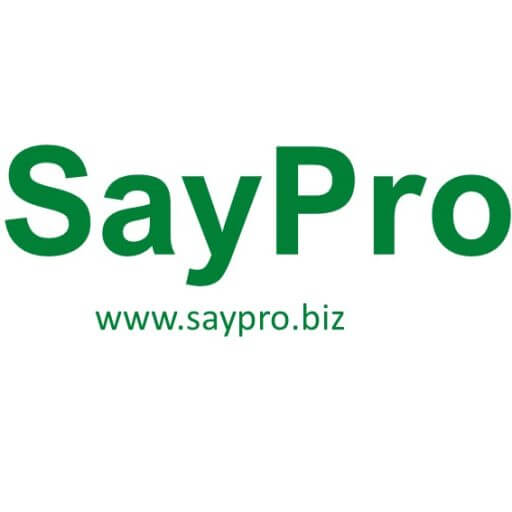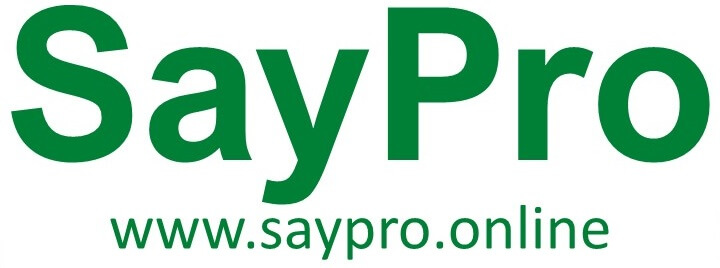Your basket is currently empty!

SayPro Course on Bid Strategy Development: Develop strategies
R8 999,00
Description
Welcome to the SayPro Introduction to Bid Strategy Development course! In this comprehensive training program, we will explore the fundamental principles and advanced strategies essential for successful bidding in competitive markets. Whether you are new to bid strategy development or seeking to enhance your existing skills, this course is designed to equip you with the knowledge and practical tools needed to navigate the complexities of bidding processes effectively.
Course Objectives
By the end of this course, you will:
– Understand the importance of bid strategies in securing contracts and projects.
– Gain proficiency in analyzing bid requirements and documents.
– Learn techniques for conducting thorough market research and competitive analysis.
– Develop skills in strategic planning, risk assessment, and financial modeling for bids.
– Enhance your ability to craft compelling bid proposals and deliver persuasive presentations.
Course Structure
This course is divided into several modules, each focusing on key aspects of bid strategy development. We will cover essential topics such as understanding bid requirements, conducting market analysis, strategic planning, financial considerations, negotiation techniques, and post-bid evaluation. Through a combination of theoretical insights, practical examples, hands-on tasks, assignments, and quizzes, you will have the opportunity to apply learned concepts in real-world scenarios.
Who Should Take This Course?
This course is suitable for:
– Professionals involved in business development, sales, and procurement.
– Small business owners and entrepreneurs looking to expand their opportunities through bidding.
– Individuals responsible for preparing and submitting bids in public and private sector procurement processes.
– Anyone interested in mastering the art of successful bidding strategies.
Learning Approach
Throughout this course, we emphasize a learner-centered approach, where your active participation is encouraged. Each module is structured to build upon the previous one, ensuring a logical progression of knowledge and skills development. You will have access to practical exercises, case studies, and quizzes designed to reinforce learning and facilitate practical application.
Certification
Upon successful completion of the course, you will receive a SayPro Certificate of Achievement, recognizing your commitment to mastering bid strategy development.
Get Started!
We are excited to embark on this journey with you toward becoming proficient in bid strategy development. Let’s dive into the first module, where we will explore the foundational concepts and importance of bid strategies in competitive environments.
Get ready to unlock your potential and enhance your professional skills in bid strategy development with SayPro!
Certainly! Here’s a structured outline for the “SayPro Fundamentals of Bidding” module, focusing on essential terms, concepts, and skills necessary for effective bidding:
SayPro Fundamentals of Bidding
Welcome to the SayPro Fundamentals of Bidding module! In this module, we will lay the groundwork for understanding the key concepts and terminology essential for successful bidding in competitive markets. Whether you are new to bidding or looking to reinforce your foundational knowledge, this module will provide you with the necessary tools to navigate bid processes confidently.
Learning Objectives
By the end of this module, you will:
– Understand fundamental terms and concepts used in bidding.
– Gain insights into different types of bidding processes.
– Recognize the importance of bid preparation and documentation.
Module Outline
1.1 Key Terms and Concepts in Bidding
In this section, we will cover essential terminology and concepts that form the basis of bidding processes. Understanding these terms is crucial for effective communication and comprehension throughout the bidding lifecycle.
Tasks and Assignments:
– Task: Create a glossary of at least 10 key terms related to bidding and their definitions.
– Assignment: Analyse a sample bid document and highlight five key terms critical to understanding the bidding requirements.
Quiz:
- Why are bid strategies crucial in competitive bidding processes?
- Define the term “Request for Proposal (RFP)” and explain its significance in bidding.
1.2 Types of Bidding Processes
Explore the different types of bidding processes commonly used in procurement and contracting. Understanding these variations will help you tailor your approach to meet specific project requirements.
Tasks and Assignments:
– Task: Compare and contrast sealed bidding and competitive negotiation processes.
– Assignment: Develop a flowchart illustrating the stages of a typical bidding process, highlighting key decision points.
Quiz:
- Describe the characteristics of sealed bidding.
- What are the advantages and disadvantages of competitive negotiation?
1.3 Importance of Bid Preparation and Documentation
Learn why thorough bid preparation and meticulous documentation are critical to success in bidding. We will discuss best practices for preparing bid documents and the importance of compliance with submission requirements.
Tasks and Assignments:
– Task: Draft a checklist for preparing a bid proposal, including key components and submission guidelines.
– Assignment: Evaluate a mock bid proposal for completeness and compliance with specified requirements.
Quiz:
- List three elements that should be included in a bid proposal.
- Why is compliance with submission requirements important in bidding?
Conclusion
Congratulations on completing the SayPro Fundamentals of Bidding module! You now have a solid understanding of essential terms, concepts, and practices that form the foundation of successful bidding. In the next module, we will delve deeper into market analysis and research, preparing you to conduct informed and strategic bidding activities.
Certainly! Here’s a structured outline for the “SayPro Market Analysis and Research” module, focusing on the importance of thorough market research in bid strategy development:
SayPro Market Analysis and Research
Welcome to the SayPro Market Analysis and Research module! In this module, we will explore the critical role of market analysis and research in developing effective bid strategies. Understanding market dynamics and customer needs is essential for crafting competitive bids that stand out in the marketplace.
Learning Objectives
By the end of this module, you will:
– Understand the importance of conducting market analysis in bid strategy development.
– Learn techniques for gathering and analysing market data effectively.
– Gain insights into competitor analysis and its significance in bidding processes.
Module Outline
2.1 Conducting Market Research for Bidding
This section focuses on the importance of thorough market research in preparing competitive bid proposals. You will learn various techniques and tools for gathering and analyzing market data to inform your bidding strategies.
Tasks and Assignments:
– Task: Conduct a SWOT analysis for your chosen industry sector relevant to bidding.
– Assignment: Prepare a market research report outlining trends and potential opportunities for a specific bidding scenario.
Quiz:
- Why is it essential to conduct competitor analysis during market research for bidding?
- Discuss two methods for gathering primary market research data.
2.2 Analysing Customer Needs and Requirements
Explore the process of identifying and analyzing customer needs and requirements. Understanding these factors is crucial for tailoring your bid proposals to meet the specific expectations and priorities of potential clients.
Tasks and Assignments:
– Task: Develop a customer needs assessment questionnaire for a hypothetical bidding scenario.
– Assignment: Analyze a case study involving successfully aligning bid proposals with customer requirements.
Quiz:
- What are the benefits of aligning bid proposals with customer needs?
- Explain the difference between qualitative and quantitative research methods in understanding customer requirements.
2.3 Competitor Analysis and Benchmarking
Learn how to conduct effective competitor analysis to identify strengths, weaknesses, opportunities, and threats posed by competitors. Benchmarking against competitors’ strategies can provide valuable insights for shaping your own bid strategies.
Tasks and Assignments:
– Task: Create a competitive matrix comparing your organization’s strengths and weaknesses with those of key competitors.
– Assignment: Evaluate a competitor’s bid proposal and identify potential areas for differentiation and improvement.
Quiz:
- Describe the steps involved in conducting competitor analysis.
- How can benchmarking help in improving bid strategy development?
Conclusion
Congratulations on completing the SayPro Market Analysis and Research module! You now have a solid understanding of the importance of market analysis, customer needs assessment, and competitor analysis in developing effective bid strategies. In the next module, we will delve into strategic planning for bids, equipping you with tools and techniques to enhance your bidding success.
SayPro Understanding Bid Requirements
Welcome to the SayPro Understanding Bid Requirements module! In this module, we will delve into the essential aspects of bid documents and requirements. Understanding and effectively interpreting bid requirements are crucial for preparing accurate and compliant bid proposals that meet client expectations.
Learning Objectives
By the end of this module, you will:
– Understand the structure and components of bid documents.
– Learn how to decipher and interpret bid requirements effectively.
– Gain insights into the importance of compliance with bid submission guidelines.
Module Outline
3.1 Deciphering Bid Documents
In this section, we will explore the typical structure and key components of bid documents. You will learn how to navigate bid documents to identify critical information and requirements essential for preparing competitive bid proposals.
Tasks and Assignments:
– Task: Analyze a sample bid document and create a checklist of mandatory and optional requirements.
– Assignment: Prepare a summary highlighting key deadlines and deliverables from a provided bid document.
Quiz:
- What are the typical sections found in a bid document?
- Explain the importance of understanding the scope of work outlined in a bid document.
3.2 Identifying Mandatory and Optional Requirements
Learn how to differentiate between mandatory and optional requirements specified in bid documents. Understanding these distinctions is essential for prioritizing efforts and resources in bid preparation.
Tasks and Assignments:
– Task: Review a set of bid requirements and categorize them into mandatory and optional criteria.
– Assignment: Discuss the implications of failing to meet mandatory requirements in a bid submission.
Quiz:
- Define the term “mandatory requirement” in the context of bidding.
- Provide examples of optional criteria commonly included in bid documents.
3.3 Compliance with Bid Submission Guidelines
Explore the importance of compliance with bid submission guidelines and requirements. We will discuss best practices for ensuring that bid proposals meet all specified criteria and are submitted correctly and on time.
Tasks and Assignments:
– Task: Develop a checklist for ensuring compliance with bid submission guidelines.
– Assignment: Evaluate a mock bid proposal for adherence to specified submission requirements.
Quiz:
- Why is compliance with submission guidelines critical in bidding processes?
- List three common challenges associated with ensuring compliance in bid submissions.
Conclusion
Congratulations on completing the SayPro Understanding Bid Requirements module! You now have a solid understanding of how to decipher bid documents, identify key requirements, and ensure compliance with submission guidelines. In the next module, we will explore strategic planning for bids, equipping you with tools and techniques to develop competitive bid strategies effectively.
SayPro Strategic Planning for Bids
Welcome to the SayPro Strategic Planning for Bids module! In this module, we will explore the essential aspects of strategic planning in bid development. Strategic planning enables organizations to align their resources and capabilities with bid requirements effectively, increasing their chances of securing contracts and projects.
Learning Objectives
By the end of this module, you will:
– Understand the importance of strategic planning in bid development.
– Learn techniques for setting bid objectives and goals.
– Gain insights into developing a timeline and milestones for bidding activities.
Module Outline
4.1 Setting Bid Objectives and Goals
In this section, we will discuss the significance of defining clear bid objectives and goals. You will learn how to establish SMART (Specific, Measurable, Achievable, Relevant, Time-bound) objectives that guide your bid preparation efforts.
Tasks and Assignments:
– Task: Draft SMART objectives for a hypothetical bidding scenario.
– Assignment: Discuss the role of bid objectives in aligning organizational goals with bidding strategies.
Quiz:
- Why is it important to set specific objectives for bid proposals?
- Describe the characteristics of a SMART objective.
4.2 Developing a Bidding Timeline and Milestones
Explore the process of developing a comprehensive bidding timeline and milestones. Effective time management ensures that bid preparations proceed systematically and meet critical deadlines.
Tasks and Assignments:
– Task: Create a Gantt chart or timeline illustrating the stages of a typical bidding process.
– Assignment: Evaluate the importance of milestone achievements in monitoring bid progress and adjusting strategies as needed.
Quiz:
- List three advantages of developing a detailed bidding timeline.
- How can milestones help in tracking and managing bidding activities effectively?
4.3 Resource Allocation and Management
Learn strategies for allocating and managing resources effectively during bid preparation. We will discuss how to optimize resource utilization to enhance competitiveness and maximize bid success.
Tasks and Assignments:
– Task: Develop a resource allocation plan for a complex bidding project.
– Assignment: Discuss the challenges and benefits of resource management in bid preparation.
Quiz:
- Why is resource allocation crucial in bid preparation?
- Provide examples of resources that may be allocated during the bidding process.
Conclusion
Congratulations on completing the SayPro Strategic Planning for Bids module! You now have a solid understanding of the importance of strategic planning, setting bid objectives, developing timelines, and managing resources effectively in bid development. In the next module, we will explore risk assessment and mitigation strategies, equipping you with tools to identify and manage risks in bidding processes.
This module structure provides a comprehensive exploration of strategic planning for bids, incorporating practical tasks, assignments, and quizzes to reinforce learning and application of key concepts. It prepares participants to develop structured and effective bid strategies that align with organizational goals and maximize competitiveness in bidding processes.
Certainly! Here’s a structured outline for the “SayPro Risk Assessment and Mitigation Strategies” module, focusing on identifying and managing risks in bid strategy development:
SayPro Risk Assessment and Mitigation Strategies
Welcome to the SayPro Risk Assessment and Mitigation Strategies module! In this module, we will explore the critical aspects of identifying, assessing, and mitigating risks in bid strategy development. Effective risk management is essential for minimizing uncertainties and enhancing the success rate of bid proposals.
Learning Objectives
By the end of this module, you will:
– Understand the importance of risk assessment in bid strategy development.
– Learn techniques for identifying and categorizing risks in bidding processes.
– Gain insights into developing effective mitigation strategies to address identified risks.
Module Outline
5.1 Importance of Risk Assessment in Bidding
In this section, we will discuss why conducting comprehensive risk assessments is crucial for successful bidding. You will learn how to identify potential risks that may impact bid proposals and project outcomes.
Tasks and Assignments:
– Task: Conduct a risk assessment for a hypothetical bidding scenario, identifying potential risks and their impact.
– Assignment: Discuss the implications of overlooking risk assessment in bid strategy development.
Quiz:
- Why is risk assessment important in bid strategy development?
- Provide examples of internal and external factors that may pose risks in bidding processes.
5.2 Techniques for Identifying and Categorizing Risks
Explore various techniques and tools for effectively identifying and categorizing risks in bidding processes. Understanding the types and sources of risks helps in prioritizing mitigation efforts.
Tasks and Assignments:
– Task: Use a risk register template to categorize identified risks into different risk categories (e.g., technical, financial, legal).
– Assignment: Compare qualitative and quantitative approaches to risk assessment in bidding.
Quiz:
- Differentiate between qualitative and quantitative risk assessment methods.
- How can historical data and lessons learned contribute to identifying risks in bid strategy development?
5.3 Developing Effective Mitigation Strategies
Learn strategies for developing proactive mitigation plans to address identified risks effectively. We will discuss the importance of contingency planning and risk response strategies in minimizing the impact of potential risks on bid outcomes.
Tasks and Assignments:
– Task: Create a risk mitigation plan for a high-impact risk identified in a bid scenario.
– Assignment: Evaluate the effectiveness of different risk response strategies in mitigating bid-related risks.
Quiz:
- List three common risk response strategies used in bid strategy development.
- Discuss the role of contingency planning in risk mitigation during bidding processes.
Conclusion
Congratulations on completing the SayPro Risk Assessment and Mitigation Strategies module! You now have a solid understanding of the importance of risk assessment, techniques for identifying and categorizing risks, and strategies for developing effective mitigation plans in bid strategy development. In the next module, we will explore financial considerations in bidding, equipping you with tools and techniques for estimating costs, pricing strategies, and financial modelling for bid proposals.
This module structure provides a comprehensive exploration of risk assessment and mitigation strategies in bid strategy development, incorporating practical tasks, assignments, and quizzes to reinforce learning and application of key concepts. It prepares participants to proactively manage risks and enhance the competitiveness of bid proposals through effective risk management strategies.
Certainly! Here’s a structured outline for the “SayPro Financial Considerations in Bidding” module, focusing on estimating costs, pricing strategies, and financial modelling for bid proposals:
SayPro Financial Considerations in Bidding
Welcome to the SayPro Financial Considerations in Bidding module! In this module, we will explore the critical aspects of financial planning and analysis in bid strategy development. Understanding and effectively managing financial considerations are essential for preparing competitive and sustainable bid proposals.
Learning Objectives
By the end of this module, you will:
– Understand the importance of financial considerations in bid strategy development.
– Learn techniques for estimating costs and pricing bid proposals.
– Gain insights into financial modelling and profitability analysis for bid projects.
Module Outline
6.1 Estimating Costs for Bidding
In this section, we will discuss the process of estimating costs associated with bidding for contracts and projects. You will learn various techniques and factors to consider when calculating direct and indirect costs.
Tasks and Assignments:
– Task: Prepare a cost estimation worksheet for a hypothetical bidding scenario, including direct and indirect costs.
– Assignment: Discuss the impact of accurate cost estimation on bid competitiveness and profitability.
Quiz:
- Why is accurate cost estimation crucial in bid strategy development?
- Describe the difference between direct costs and indirect costs in bidding.
6.2 Pricing Strategies for Bid Proposals
Explore different pricing strategies commonly used in bid proposals, such as cost-based pricing, competitive pricing, and value-based pricing. Understanding these strategies helps in determining the optimal pricing approach for maximizing profitability and competitiveness.
Tasks and Assignments:
– Task: Analyse pricing strategies used by competitors in a specific industry sector.
– Assignment: Develop a pricing strategy for a bid proposal that aligns with client expectations and market conditions.
Quiz:
- Provide examples of three pricing strategies used in bid proposals.
- Discuss the factors that should be considered when selecting a pricing strategy for bid proposals.
6.3 Financial Modelling and Profitability Analysis
Learn how to develop financial models and conduct profitability analysis for bid projects. We will discuss techniques for forecasting revenues, calculating profitability metrics, and assessing financial viability.
Tasks and Assignments:
– Task: Create a financial model for a bid project, incorporating revenue forecasts and cost projections.
– Assignment: Evaluate the financial viability and profitability of a proposed bid project using relevant financial metrics.
Quiz:
- What is the purpose of financial modelling in bid strategy development?
- List three profitability metrics used to assess bid project viability.
Conclusion
Congratulations on completing the SayPro Financial Considerations in Bidding module! You now have a solid understanding of the importance of financial planning, cost estimation, pricing strategies, and profitability analysis in bid strategy development. In the next module, we will explore proposal development and writing, equipping you with skills to craft compelling and persuasive bid proposals that stand out in competitive bidding processes.
This module structure provides a comprehensive exploration of financial considerations in bidding, incorporating practical tasks, assignments, and quizzes to reinforce learning and application of key concepts. It prepares participants to effectively manage financial aspects of bid proposals and enhance competitiveness through strategic financial planning and analysis.
Certainly! Here’s a structured outline for the “SayPro Proposal Development and Writing” module, focusing on crafting compelling and persuasive bid proposals:
SayPro Proposal Development and Writing
Welcome to the SayPro Proposal Development and Writing module! In this module, we will explore the essential aspects of developing and writing compelling bid proposals. Effective proposal development and writing are critical for communicating your organization’s capabilities, solutions, and value proposition to potential clients.
Learning Objectives
By the end of this module, you will:
– Understand the components of a well-structured bid proposal.
– Learn techniques for crafting clear, concise, and persuasive content.
– Gain insights into tailoring bid proposals to meet client requirements and expectations.
Module Outline
7.1 Structuring a Compelling Bid Proposal
In this section, we will discuss the fundamental components and structure of a bid proposal. You will learn how to organize your proposal to effectively convey your organization’s strengths, capabilities, and solutions.
Tasks and Assignments:
– Task: Outline the sections of a bid proposal and describe the purpose of each section.
– Assignment: Develop a framework for a bid proposal based on a provided scenario, including headings and subheadings.
Quiz:
- List the essential sections commonly found in a bid proposal.
- Why is it important to follow a structured approach when writing bid proposals?
7.2 Writing Persuasively and Concisely
Explore techniques for writing persuasively and concisely in bid proposals. You will learn how to articulate your organization’s value proposition effectively and differentiate your bid from competitors.
Tasks and Assignments:
– Task: Write a compelling executive summary for a hypothetical bid proposal.
– Assignment: Critique a sample bid proposal for clarity, persuasiveness, and conciseness.
Quiz:
- What are three key elements of persuasive writing in bid proposals?
- Discuss strategies for maintaining clarity and conciseness in bid proposal content.
7.3 Tailoring Proposals to Client Requirements
Learn how to tailor bid proposals to meet specific client requirements and expectations. We will discuss techniques for conducting client-centric proposal customization that enhances proposal relevance and competitiveness.
Tasks and Assignments:
– Task: Analyse client requirements from a provided RFP and outline how you would customize your bid proposal accordingly.
– Assignment: Discuss the benefits of client-centric proposal customization in improving bid success rates.
Quiz:
- Why is it important to customize bid proposals to meet client requirements?
- Provide examples of ways to demonstrate alignment with client goals and objectives in bid proposals.
Conclusion
Congratulations on completing the SayPro Proposal Development and Writing module! You now have a solid understanding of how to structure, write, and customize compelling bid proposals that effectively communicate your organization’s capabilities and solutions. In the next module, we will explore presentation and communication skills, equipping you with strategies for delivering impactful bid presentations.
This module structure provides a comprehensive exploration of proposal development and writing in bid strategy development, incorporating practical tasks, assignments, and quizzes to reinforce learning and application of key concepts. It prepares participants to craft persuasive bid proposals that stand out in competitive bidding processes and effectively communicate their organization’s value proposition to potential clients.
Certainly! Here’s a structured outline for the “SayPro Presentation and Communication Skills” module, focusing on delivering impactful bid presentations and enhancing communication abilities:
SayPro Presentation and Communication Skills
Welcome to the SayPro Presentation and Communication Skills module! In this module, we will explore the essential aspects of delivering impactful bid presentations and enhancing communication skills. Effective presentation and communication are crucial for engaging stakeholders, conveying your bid proposal persuasively, and maximizing your chances of success in competitive bidding processes.
Learning Objectives
By the end of this module, you will:
– Understand the importance of presentation skills in bid strategy development.
– Learn techniques for preparing and delivering engaging bid presentations.
– Gain insights into enhancing verbal and non-verbal communication during bid presentations.
Module Outline
8.1 Importance of Presentation Skills in Bidding
In this section, we will discuss why strong presentation skills are essential for successful bid strategy development. You will learn how effective presentations can enhance stakeholder engagement and support in securing contracts and projects.
Tasks and Assignments:
– Task: Identify key elements of effective presentation skills relevant to bidding contexts.
– Assignment: Prepare an outline for a bid presentation, including key messages and presentation structure.
Quiz:
- List three benefits of strong presentation skills in bid strategy development.
- Discuss the role of preparation in delivering effective bid presentations.
8.2 Techniques for Preparing Engaging Bid Presentations
Explore techniques and best practices for preparing engaging bid presentations. You will learn how to structure your presentation effectively, craft compelling visuals, and engage your audience throughout the presentation.
Tasks and Assignments:
– Task: Develop a storyboard or outline for a bid presentation, including slide content and visual aids.
– Assignment: Critique a sample bid presentation for clarity, relevance, and engagement.
Quiz:
- What are three key elements of an engaging bid presentation?
- Discuss strategies for maintaining audience engagement during bid presentations.
8.3 Enhancing Verbal and Non-Verbal Communication
Learn strategies for enhancing verbal and non-verbal communication skills during bid presentations. Effective communication fosters understanding, builds credibility, and reinforces your organization’s capabilities and commitment.
Tasks and Assignments:
– Task: Practice delivering a portion of a bid presentation, focusing on clarity and confidence in verbal delivery.
– Assignment: Conduct a self-assessment of your non-verbal communication skills during a mock bid presentation.
Quiz:
- Why is non-verbal communication important in bid presentations?
- Provide examples of non-verbal cues that can enhance or detract from your message during a presentation.
Conclusion
Congratulations on completing the SayPro Presentation and Communication Skills module! You now have a solid understanding of the importance of presentation skills, techniques for preparing engaging bid presentations, and strategies for enhancing verbal and non-verbal communication. These skills will equip you to deliver impactful bid presentations that effectively communicate your organization’s strengths and value proposition to potential clients. In the final module, we will summarize key learnings and discuss best practices for ongoing professional development in bid strategy development.
This module structure provides a comprehensive exploration of presentation and communication skills in bid strategy development, incorporating practical tasks, assignments, and quizzes to reinforce learning and application of key concepts. It prepares participants to confidently deliver persuasive bid presentations and effectively communicate their organization’s capabilities and solutions in competitive bidding processes.
Certainly! Here’s a structured outline for the “SayPro Negotiation Techniques” module, focusing on developing effective negotiation skills in bid strategy development:
SayPro Negotiation Techniques
Welcome to the SayPro Negotiation Techniques module! In this module, we will explore the essential aspects of negotiation skills in bid strategy development. Effective negotiation techniques are crucial for achieving favourable outcomes, building relationships with clients, and maximizing success in competitive bidding processes.
Learning Objectives
By the end of this module, you will:
– Understand the importance of negotiation skills in bid strategy development.
– Learn techniques for preparing and conducting successful negotiations.
– Gain insights into handling objections and closing deals effectively.
Module Outline
9.1 Importance of Negotiation Skills in Bidding
In this section, we will discuss why strong negotiation skills are essential for successful bid strategy development. You will learn how effective negotiation techniques can lead to mutually beneficial agreements and enhance competitive advantage.
Tasks and Assignments:
– Task: Identify key attributes of effective negotiators and their relevance to bidding contexts.
– Assignment: Prepare a negotiation strategy outline for a hypothetical bidding scenario, including goals and tactics.
Quiz:
- List three benefits of strong negotiation skills in bid strategy development.
- Discuss the role of preparation in achieving successful negotiations.
9.2 Techniques for Preparing and Conducting Negotiations
Explore techniques and best practices for preparing and conducting negotiations in bid processes. You will learn how to establish objectives, gather information, and adapt strategies to achieve favourable outcomes.
Tasks and Assignments:
– Task: Role-play a negotiation scenario with a colleague or mentor, focusing on applying negotiation techniques learned.
– Assignment: Analyse a case study involving successful negotiation tactics used in a bidding context.
Quiz:
- What are three key stages in the negotiation process?
- Discuss the importance of flexibility and adaptability in negotiation strategies.
9.3 Handling Objections and Closing Deals
Learn strategies for handling objections and closing deals effectively during bid negotiations. We will discuss techniques for addressing client concerns, presenting compelling solutions, and finalizing agreements.
Tasks and Assignments:
– Task: Develop responses to common objections that may arise during bid negotiations.
– Assignment: Role-play a negotiation scenario where you successfully overcome objections and close a deal.
Quiz:
- How can active listening skills contribute to overcoming objections in negotiations?
- Provide examples of closing techniques used in bid negotiations.
Conclusion
Congratulations on completing the SayPro Negotiation Techniques module! You now have a solid understanding of the importance of negotiation skills, techniques for preparing and conducting negotiations, and strategies for handling objections and closing deals effectively in bid strategy development. These skills will empower you to negotiate confidently and achieve favourable outcomes in competitive bidding processes. Thank you for your participation in this course!
This module structure provides a comprehensive exploration of negotiation techniques in bid strategy development, incorporating practical tasks, assignments, and quizzes to reinforce learning and application of key concepts. It prepares participants to navigate negotiation challenges effectively, enhance client relationships, and maximize success in securing contracts and projects through strategic negotiation skills.
Certainly! Here’s a structured outline for the “SayPro Case Studies and Practical Exercises” module, focusing on applying knowledge through real-world case studies and practical exercises in bid strategy development:
SayPro Case Studies and Practical Exercises
Welcome to the SayPro Case Studies and Practical Exercises module! In this module, we will apply the knowledge and skills gained throughout the course to real-world scenarios and practical exercises. Case studies and exercises provide valuable opportunities to analyse, practice, and refine bid strategy development techniques in various bidding contexts.
Learning Objectives
By the end of this module, you will:
– Apply theoretical knowledge to practical bid strategy development scenarios.
– Analyse case studies to identify successful bid strategies and lessons learned.
– Engage in practical exercises to simulate bidding processes and enhance skills.
Module Outline
10.1 Analysing Case Studies in Bid Strategy Development
In this section, we will examine real-world case studies of successful bid strategies. You will analyse different bidding scenarios, identify key factors contributing to success, and extract valuable lessons applicable to your own bid strategy development.
Tasks and Assignments:
– Task: Analyse a case study of a successful bid strategy implementation, identifying key strategies and outcomes.
– Assignment: Prepare a summary report outlining lessons learned and recommendations for improving bid strategies based on the case study.
10.2 Practical Exercises in Bid Strategy Development
Engage in practical exercises to simulate various aspects of bid strategy development. These exercises will allow you to apply theoretical knowledge, practice critical skills, and enhance your capabilities in preparing competitive bid proposals.
Tasks and Assignments:
– Task: Participate in a mock bidding exercise where you develop a bid proposal based on provided specifications and requirements.
– Assignment: Conduct a peer review of bid proposals developed during the exercise, providing constructive feedback and recommendations.
10.3 Reflection and Integration
Reflect on your learning journey throughout the course and integrate insights gained from case studies and practical exercises into your approach to bid strategy development. Discuss how you can apply these learnings to improve your future bidding strategies.
Tasks and Assignments:
– Task: Write a reflective essay on your experience with bid strategy development, highlighting key learnings and personal insights.
– Assignment: Develop an action plan outlining steps to apply course learnings and improve bid strategy development skills in your professional practice.
Conclusion
Congratulations on completing the SayPro Case Studies and Practical Exercises module! You have successfully applied theoretical knowledge to practical bidding scenarios, analysed case studies to identify successful bid strategies, and engaged in exercises to enhance your bid strategy development skills. These experiences have equipped you with valuable insights and capabilities to navigate competitive bidding processes effectively. Thank you for your dedication and participation in this course!
Certainly! Here’s a structured outline for the “SayPro Conclusion and Next Steps” module, focusing on summarizing key learnings and outlining future steps in bid strategy development:
SayPro Conclusion and Next Steps
Welcome to the SayPro Conclusion and Next Steps module! In this final module, we will summarize key learnings from the course on bid strategy development and outline actionable next steps to further enhance your skills and capabilities in this field.
Learning Objectives
By the end of this module, you will:
– Recap key concepts and insights gained throughout the course.
– Identify areas for further professional development in bid strategy development.
– Develop a personalized action plan for ongoing growth and improvement.
Module Outline
11.1 Recap of Key Learnings
In this section, we will review and summarize the key concepts, strategies, and techniques covered throughout the course on bid strategy development. This recap will reinforce your understanding of essential elements in preparing competitive bid proposals.
Tasks and Assignments:
– Task: Create a mind map or summary document highlighting key learnings and takeaways from each module of the course.
– Assignment: Write a brief reflection on your overall learning experience in the course, identifying the most valuable insights gained.
11.2 Areas for Further Professional Development
Explore opportunities for further professional development in bid strategy development. We will discuss advanced topics, specialized skills, and additional resources that can support your continuous growth in this field.
Tasks and Assignments:
– Task: Identify two specific areas within bid strategy development where you would like to deepen your knowledge or skills.
– Assignment: Research and propose a plan for continuing education or training opportunities related to bid strategy development.
11.3 Developing a Personalized Action Plan
Develop a personalized action plan outlining actionable steps to apply course learnings and enhance your effectiveness in bid strategy development. Your action plan should include specific goals, timelines, and strategies for implementation.
Tasks and Assignments:
– Task: Draft an action plan that includes at least three SMART goals related to improving your bid strategy development skills.
– Assignment: Reflect on potential challenges and strategies for overcoming them as you implement your action plan.
Conclusion
Congratulations on completing the SayPro Bid Strategy Development Training Course! You have gained valuable knowledge and skills in preparing competitive bid proposals, conducting market analysis, negotiating effectively, and more. By applying these insights and continuing to develop your expertise, you are well-positioned to excel in competitive bidding processes and contribute to your organization’s success.
Thank you for your commitment and participation in this course. We encourage you to stay connected with SayPro for future updates, resources, and opportunities to further advance your professional development in bid strategy development. Best wishes for your continued success!
This module structure provides a comprehensive conclusion to the SayPro Bid Strategy Development Training Course, focusing on summarizing key learnings, identifying areas for further development, and developing a personalized action plan for ongoing growth in bid strategy development. It encourages participants to reflect on their learning journey, set actionable goals, and continue their professional development in this specialized field.
You must be logged in to post a review.
Vendor Information
- No ratings found yet!














Reviews
There are no reviews yet.